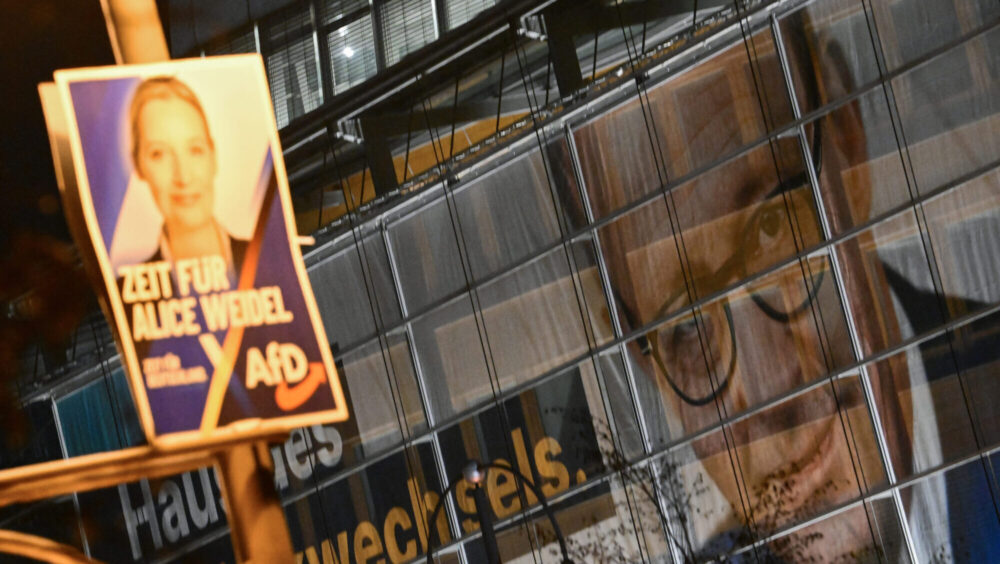
A giant banner with an image of CDU leader Friedrich Merz is seen on the CDU’s headquarters, near a lamppost with an election poster of AfD co-leader Alice Weidel
Tobias SCHWARZ / AFP
Talking tough on migration has reaped its reward in Germany: both the centre-right CDU/CSU alliance and the right-wing Alternative für Deutschland (AfD) party have risen in the polls following their support for a non-binding motion that aims to turn back migrants at the border.
According to a survey commissioned by public broadcaster ARD, both parties gained one percentage point compared to a previous poll. The CDU/CSU alliance now stands at 31%, making it the frontrunner for the elections on February 23rd. The AfD is on 21% in second place.
Germany, Infratest dimap poll:
— Europe Elects (@EuropeElects) February 6, 2025
CDU/CSU-EPP: 31% (+1)
AfD-ESN: 21% (+1)
SPD-S&D: 15%
GRÜNE-G/EFA: 14% (-1)
LINKE-LEFT: 5%
FDP-RE: 4%
BSW-NI: 4%
+/- vs. 27-29 January 2025
Fieldwork: 3-5 February 2025
Sample size: 1,302
➤ https://t.co/obOCVirbpF pic.twitter.com/vJ9jO3wmQ5
They are followed by the two ruling parties, the Social Democrats (SPD) on 15%, and the Greens on 14%. The only other party to make it into parliament would be the far-left Die Linke (5%).
The poll coincides with a recent survey which says 63% of Germans support the proposal to consistently reject asylum seekers without an entry permit at the borders, with only a quarter rejecting the idea.
Germany has pursued lax migration policies under both the current government and the previous cabinet led by the centre-right, allowing millions of undocumented migrants to enter the country. This has resulted in a soaring rise in crime, terrorist attacks, and most recently, a spate of knife attacks committed by migrants, many of whom should have been deported but were allowed to stay.
CDU leader Friedrich Merz has vowed to shift his party back to its conservative roots, with a focus on tougher asylum laws. Despite cooperating with the AfD to pass a motion on closing Germany’s borders to illegal migrants—and thereby tearing down the cordon saintaire surrounding the right-wing party—Merz insists he will never enter into a coalition with them.
Forming a government will therefore be very difficult after the elections: The CDU/CSU will have to rely on either the Social Democrats or the Greens to set up a coalition, but such a scenario seems increasingly unlikely as the hostility between the parties continues to grow.
The leftist forces reject the centre-right’s stance on immigration: SPD Secretary-General Lars Klingbeil said his party would never accept a de facto entry ban for undocumented migrants, stressing that such a move would go against the constitution, the European treaties, and international law.
The Greens espouse even more left-wing policies on migration than the SPD, so it seems highly unlikely that they can come to a compromise with Merz.
Despite a large majority of the population backing a tougher course of action, some on the Left are furious and have resorted to violence following last week’s vote in the Bundestag.
According to the daily Süddeutsche Zeitung, attacks against CDU offices and threats made against their politicians have become a daily occurrence. Many CDU posters have been vandalised, and campaigning on the streets in some cities had to be called off because staff fear for their safety.
CDU MP Christoph de Vries said he would like to see more solidarity from the SPD and the Greens. “There is a basic consensus that such attacks are condemned among democrats,” he said.
There was a huge uproar last year when SPD politician Matthias Ecke was physically assaulted whilst campaigning on the streets of Dresden, but leftist parties fail to condemn similar violence when the victims of attacks are AfD politicians.
